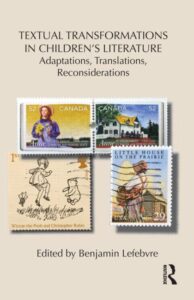
Edited by Benjamin Lefebvre
New York: Routledge, 2013. xvi + 223 pp.
Children’s Literature and Culture series
ISBN: 978-0-415-50971-8 (hardcover)
ISBN: 978-1-13-885082-8 (paperback)
ISBN: 978-0-203-09847-9 (e-book)
Rights Sold: World
Publishing History
Unjacketed hardcover, December 2012
E-book, January 2013
Trade paperback, November 2014
Synopsis
This book offers new critical approaches for the study of adaptations, abridgements, translations, parodies, and mash-ups that occur internationally in contemporary children’s culture. It follows recent shifts in adaptation studies that call for a move beyond fidelity criticism, a paradigm that measures the success of an adaptation by the level of fidelity to the “original” text, toward a methodology that considers the adaptation to be always already in conversation with the adapted text. This book visits children’s literature and culture in order to consider the generic, pedagogical, and ideological underpinnings that drive both the process and the product. Focusing on novels as well as folktales, films, graphic novels, and anime, the authors consider the challenges inherent in transforming the work of authors such as William Shakespeare, Charles Perrault, L.M. Montgomery, Laura Ingalls Wilder, and A.A. Milne into new forms that are palatable for later audiences particularly when—for perceived ideological or political reasons—the textual transformation is not only unavoidable but entirely necessary. Contributors consider the challenges inherent in transforming stories and characters from one type of text to another, across genres, languages, and time, offering a range of new models that will inform future scholarship.
Contents
Illustrations (xi–xii)
Series Editor’s Foreword / Jack Zipes (xiii)
Acknowledgments (xv)
Introduction: Reconsidering Textual Transformations in Children’s Literature / Benjamin Lefebvre (1–6)
1. Contested Spaces: Reconfiguring Narratives of Origin and Identity in Pocahontas and Princess Mononoke / David Whitley (7–20)
2. “Popular and Timeless Literature”: Ur-Stories in Graphic Novels for Young People in Contemporary India / Malini Roy (21–40)
3. Preserving Roots: Vietnamese Folktales in Cross-Cultural and Transnational Translation / Hanh Nguyen (41–55)
4. “You Will Think Them Poor Baby Stories to Make Such a Talk About”: Prose Adaptations for Children of Shakespeare’s Venetian Plays / Laura Tosi (57–72)
5. Challenges for the Chalet School: From Bookshelf to Blogosphere and Back Again / Lisa Migo (73–86)
6. Where (and When) Do You Live, Cinderella? Cultural Shifts in Polish Translations and Adaptations of Charles Perrault’s Fairy Tales / Monika Wo?niak (87–100)
7. Alice Lost and Found: A Queer Book History / Nat Hurley (101–25)
8. Patterns, Power, and Paradox: International Book Covers of Anne of Green Gables across a Century / Andrea McKenzie (127–53)
9. An no shinjô [Anne’s Feelings]: Politeness and Passion as Anime Paradox in Takahata’s Akage no An / Emily Somers (155–73)
10. Our Home on Native Land: Adapting and Readapting Laura Ingalls Wilder’s Little House on the Prairie / Benjamin Lefebvre (175–96)
11. Beyond Happily Ever After: The Aesthetic Dilemma of Multivolume Fiction for Children / Maria Nikolajeva (197–213)
Contributors (215–17)
Reviews
“A strong collection. . . . Lefebvre has found an admirable mixture of studies situated—like the contributors themselves—in a variety of cultural contexts, and at many productive points within adaptation studies and children’s literary studies. His eclectic approach celebrates the expansion of a field in the act of leaping across traditional borders.”
—Paul Tiessen, Jeunesse: Young People, Texts, Cultures
“With this volume, Lefebvre . . . provides a rich starting place for children’s literature scholars to enter existing interdisciplinary discussions about how stories evolve across cultures and genres in this age of rapid globalization. . . . The essays . . . provide an introduction to translating adaptation theory into practice in new and exciting ways that can serve as models both to experienced scholars who seek to think beyond fidelity criticism and to students who are just starting to think about the implications of adaptation across history, genre, and culture.”
—Lisa Rowe Fraustino, Children’s Literature
“Lefebvre focuses this collection on the various ideologies encouraged by and concealed within the cultural translations required by adaptation. Considered together, these eleven thought-provoking essays thus begin to provide a global, transformational account of the ways in which textual transformations for children must comprehend and contend with difference, marginality, borderlands, migration, alterity, and other cultural collisions.”
—Balaka Basu, Children’s Literature Association Quarterly
“A solid and varied study on textual transformations as they relate to gender, historical context, and cultures. . . . Textual Transformations in Children’s Literature is a book that represents an impressive and wide range of works, which provide a foundational and introductory framework for a conceptualization of the relationship between the text and its transformative forces.”
—María Fernández-Lamarque, International Research in Children’s Literature
“The considerable intellectual creativity, freedom, and attention to diversity demonstrated in Textual Transformations opens a much-needed forum on adaptation in children’s literature studies. . . . Chapter after chapter demonstrates how a clearer understanding of adaptation theory furthers our understanding of even our most familiar texts.”
—M. Tyler Sasser, The Lion and the Unicorn
“Can a classic of children’s literature retain its effectiveness if not in its original form? In 11 chapters written by experts including Maria Nikolajeva and David Whitley and such rising stars as Nat Hurley and Malini Roy, [the collection] proves that adapting, translating, transferring, and retelling or refashioning these stories enables readers to experience them in different but equally powerful ways.”
—V.A. Murrenus Pilmaier, Choice
“Both children’s literature and adaptation studies are well served by this collection. Besides providing many stimulating critical discussions, virtually every contribution in Textual Transformations is imaginative, highly informative, and well written. It is likely to inspire many a student of children’s literature.”
—Larissa Rudova, The European Legacy: Toward New Paradigms
Purchase
Amazon.ca (hardcover)
Amazon.ca (paperback)
Amazon.ca (Kindle)
Amazon.com (hardcover)
Amazon.com (paperback)
Amazon.com (Kindle)
Amazon.co.uk (hardcover)
Amazon.co.uk (paperback)
Amazon.co.uk (Kindle)
Barnes and Noble (paperback)
Barnes and Noble (Book Nook)
Blackwell’s (hardcover)
Chapters.Indigo.ca (hardcover)
Chapters.Indigo.ca (paperback)
Chapters.Indigo.ca (Kobo)
Kobo Store
Links
Textual Transformations in Children’s Literature at Routledge
Textual Transformations in Children’s Literature at Goodreads